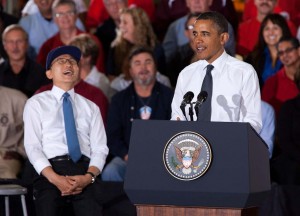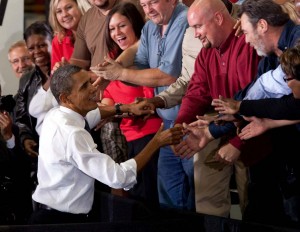
South Korean President Lee Myung-bak reacts as U.S. President Barak Obama addressed workers at a GM plant in Michigan.
President Barack Obama outlined the promised benefits of the nation’s new trade pact with Korea during a trip to a suburban Detroit assembly plant, suggesting the agreement will generate 70,000 new U.S. jobs – but he drew an especially enthusiastic response from workers when he proclaimed the controversial federal bailout of General Motors and Chrysler “worth it.”
The president journeyed to the Lake Orion assembly plant where he was joined by both South Korean President Lee Myung-bak – who wore a Detroit Tigers baseball cap for the occasion — and United Auto Workers Union President Bob King. King broke with other national labor leaders this week by lending his support to the trade agreement.
“The investment was worth it,” Obama said of the $85 billion spent on the domestic auto industry. Speaking to a cheering throng of workers, the president added that, “This is a city where a great American industry is coming back — and a city where people are dreaming up ways to prove all the skeptics wrong and write the next proud chapter in the Motor City’s history.”
The decision to take his message to the Orion plant was a significant one considering that the factory is producing a small car – the Chevrolet Sonic – that was previously built in South Korea. GM credits the labor cost reductions it was granted by the UAW in recent years for helping move that production back to the States. Still, a worker advised the president during his half-hour tour, 27% of what was previously known as the Chevy Aveo still comes from Korea.

President Obama shakes hands with General Motors workers after touting a U.S. trade agreement with South Korea.
The president stressed, during his speech, that the new Korean trade pact – one of an assortment of similar agreements approved by Congress this week – will pay off in many ways. Most significantly, however, the administration claims it will open up the long-restricted Korean market to U.S. automotive imports.
Late changes to the Korean trade agreement were designed to bolster exports to the Asian nation while preventing a flood of Korean vehicles into the U.S. The so-called “chicken tax” on foreign-made light trucks, for example, will take 8 years to phase out and should prevent makers Hyundai and Kia from moving ahead with long-discussed plans to start building pickup trucks that could establish one of the most profitable market segments for Detroit’s Big Three.
Until now, automotive trade has been extremely lopsided. Koreans bought just 7,500 American-made automobiles in 2010 while Korea shipped 562,000 vehicles to the States – a figure that does not include the rapidly-increasing number of vehicles produced at two Korean-owned assembly plants based in the U.S.
The opportunity to level that imbalance in trade helped convince UAW President King to give the agreement his backing, even as other American labor leaders sharply criticized its passage. (Click Here for that full story.)
Speaking through an interpreter, the blue-and-white Tigers cap on his head, Lee told the GM workers, “I want to give this promise to you, and that is that the (trade pact) will not take away any of your jobs. Rather, it will create more jobs for you and your family, and it is going to protect your job. And that is the pledge that I give you today,”
Ironically, GM could benefit from any expansion in business for Korean automakers as it is that nation’s third-largest carmaker after having purchased the bankrupt Daewoo a decade ago. A full 20% of the vehicles sold worldwide under the Chevrolet nameplate are produced by GM in Korea.
